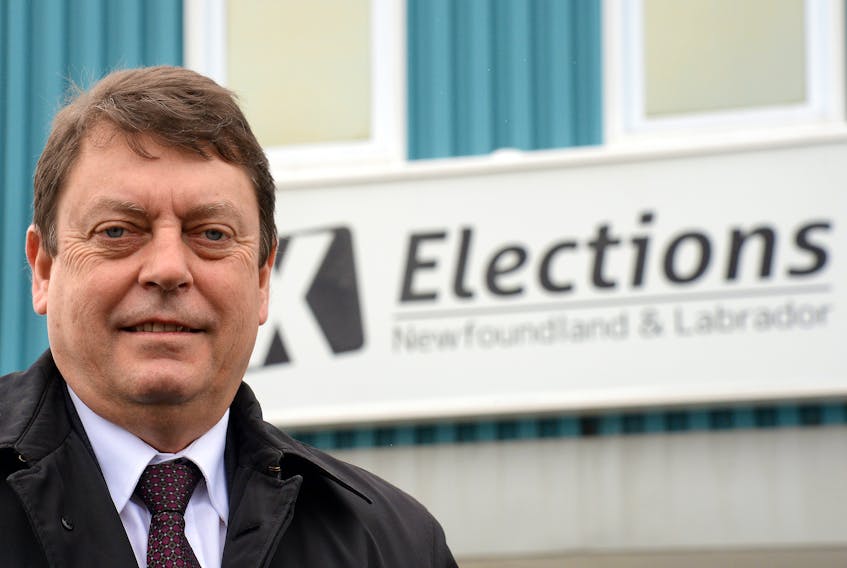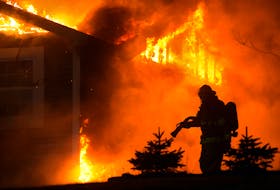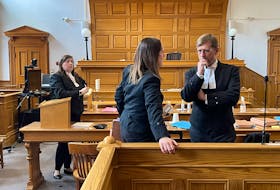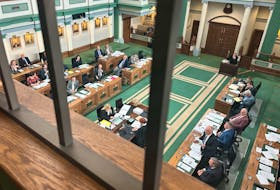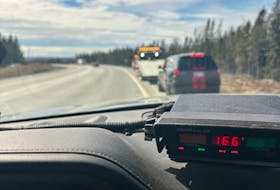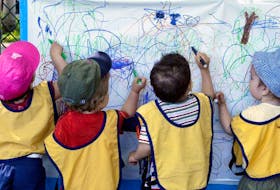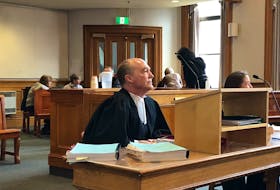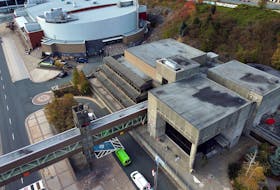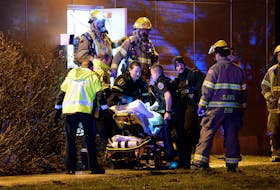ST. JOHN'S, N.L. — When Elections Newfoundland and Labrador submitted its budget for a general election last winter, it did so with a pre-pandemic scenario.
A general election costs between $6 million and $7 million.
With an expected imminent election call, there are extra locations to book for polling stations to accomodate social distancing, more staff, masks in case voters forget theirs, distance-marking floor stickers and any cleaning supplies beyond what the government has already supplied.
And an uptake in voting by mail, or special balloting, will mean extra expense, as those are done through express post.
Chief Electoral Officer Bruce Chaulk didn’t put a tally on it, but his office is on top of whatever needs to be done.
"There will be a cost. We’re tracking that cost,” he said.
One thing the mandatory mask rule did was cut down on that price tag — instead of supplying hundreds of thousands for voters on the big day, the expense is whittled down to having some on hand for whoever forgets theirs.
A certainty is that this election is likely to see people taking advantage of special balloting and voting by mail, probably in the range of 60,000 voters, if you look at what’s gone on during pandemic-era provincial elections, such as in British Columbia, Chaulk said.
That’s several times what an ordinary Newfoundland and Labrador election would see — 11,000.
But these are not ordinary times.
“I have talked to some people who say they always went to the poll, but this time they will be voting by special ballot because they don’t want to go to the poll. But we are taking every measure we can to make sure it’s a safe experience,” Chaulk said.
“After you go in and vote, someone will come in and spray it down, sanitize it in preparation for the next person.”
Chatting in the boardroom of Election NL’s St. John’s headquarters, Chaulk seemed to be taking it all in stride.
“Every election is a very significant event and requires a lot of planning in order to get it to work,” said Chaulk, who has been in the Elections NL office since just before the 2011 general election and was appointed chief electoral officer in 2016.
“A minority government situation is always a busy time because you always have to prepare as if an election will take place at any time.”
Elections NL had a practice run in the Humber-Gros Morne byelection and has meticulously crafted plans of sanitizing, social distancing and other COVID-19 prevention factors.
One might think that finding extra halls — to accommodate spreading out of polls — in rural Newfoundland and Labrador would be trickier than in urban centres such as St. John’s, Mount Pearl and Corner Brook, but Chaulk said the opposite is the case because they can be dense areas with no venues where you need them.
“It’s not uncommon for us to really struggle in urban areas,” he said.
Finding suitable available locations in the districts can be challenging, but Elections NL will tap locations that may be nearby, but in a different district if need be.
It’s a harder scenario to pinpoint available venues with no fixed-date elections.
Elections NL usually identifies people who have previously worked on elections, and there will be extra staff this time around. The additional roles at HQ are pretty much filled.
There doesn't seem to be a lot of reluctance given the pandemic.
“There will always be people who feel uncomfortable and that’s your choice if you don’t want to come to work,” Chaulk said.
“We just ask that if we got you hired, you do show up to work and don’t change your mind at the last minute because that causes more trouble.”


Through special and advance balloting there are roughly 15 days during an election when people can vote via a special ballot by mail or at the 60 returning offices spread across the province and at the St. John’s headquarters.
Chaulk's office has been in contact with the chief medical officer of health over recent months and has also taken advice from other provinces that have had an election during the pandemic.
“I expect I am going to get scenarios thrown at me that I can’t possibly anticipate,” Chaulk said of what a pandemic election will bring.
If Newfoundland and Labrador’s situation were to take a sudden turn in which a total lockdown is required with a election campaign already begun, it would be Chaulk’s call to move the date, just as in the scenario a blizzard might hit an area or one community have a COVID-19 cluster, he would make the decision to move the affected district’s voting day.
Perhaps like no other election, it’s vital for people to make sure they are on the voters’ list for things to go smoothly on election day, and to lessen the chance of having to line up outside in the cold weather for long waits.
Also because there will be extra venues in the mix, voters should read their voter notices carefully to make sure they go to the right building and not just assume the same place used for decades is also their district polling station this time around.
If everyone’s on the list, the voting process is really quick, Chaulk noted.
The ballots will be printed by the Queen’s Printer in the province, and charter flights are used to get them to places like Labrador, if driving isn’t possible.
Once the writ is dropped, candidates have to file their papers in good order with Elections NL. The deadline for official candidate nomination papers is the eighth day after the issuance of the election writ.
Elections NL has also given guidance to the political parties regarding safe campaigning.
Still, the prospect of an election during the winter and in a pandemic is causing some to have reticence about the democratic process.
David Brake, who has canvassed for municipal, provincial and federal candidates in St John's, said an election that relies heavily on social media events to reach voters will water down the experience.
“If (a winter pandemic election) happened, it would lead to even more of a democratic deficit than we have,” said Brake.
He said it would be unfair to people who don't have access to social media or don’t use it, and put extra pressure on traditional media outlets to keep watch on it all.
As well, political parties with fatter coffers will have the advertising advantage, he said.
Instead, Brake said he hopes large venues such as Mile One Centre will be employed for socially distant town-hall-style events to allow safe, in-person interaction.
Brake said as a volunteer, he doesn’t have a safety concern about going door to door, as the number of COVID-19 cases in the province is low, but he would never enter someone’s home. A winter election will limit people’s willingness to hold the door open to the cold outside while they discuss issues with a candidate or volunteer, he said.
Door knocking is essential for candidates to make their impression, Brake said.
“My feeling is that’s where the real education is,” he said.

